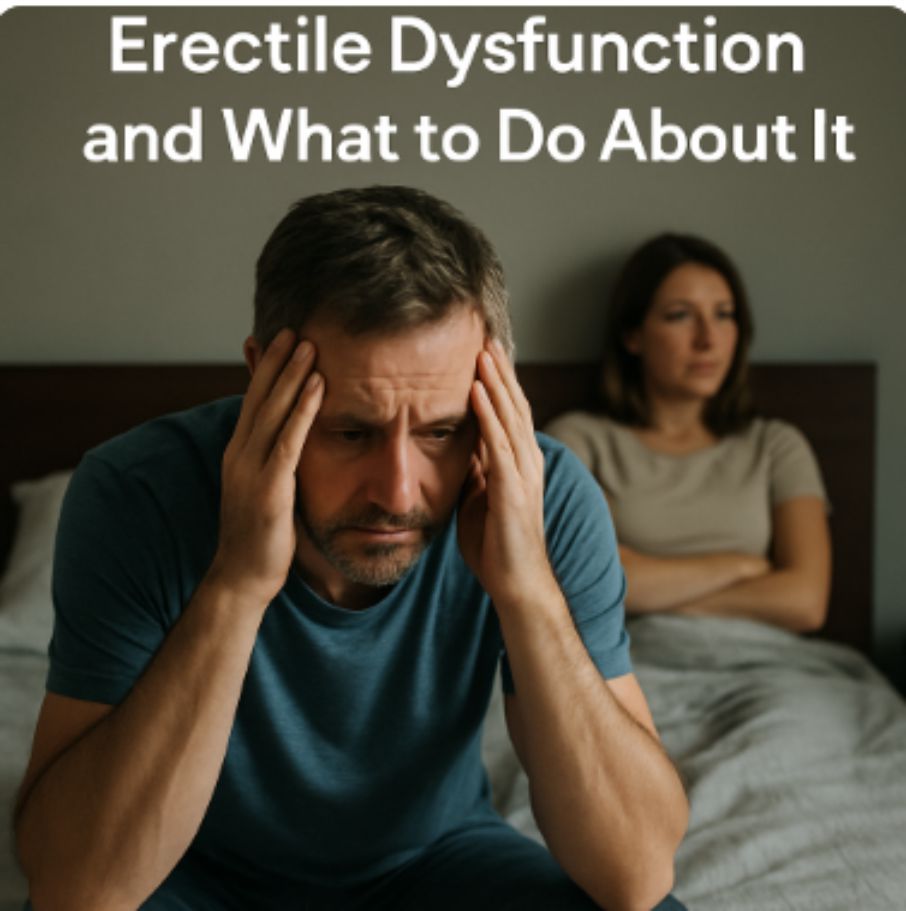Stress is a natural part of life—but when it becomes chronic, it can wreak havoc on your physical and emotional well-being. One area that is particularly vulnerable to prolonged stress is sexual health. For many men, stress is a silent but powerful contributor to erectile dysfunction (ED).
In this article, we’ll explore how stress impacts your body, the link between stress and ED, and what you can do to regain control of both your mind and sexual health.
Understanding the Stress-ED Connection
Stress triggers a cascade of physiological reactions in the body, commonly known as the “fight or flight” response. This includes:
- Increased heart rate and blood pressure
- Elevated cortisol levels (the stress hormone)
- Reduced testosterone production
- Restricted blood flow to non-essential areas like the genitals
When stress is temporary, these effects fade quickly. But when stress is constant—due to work, financial worries, health issues, or relationship problems—it begins to interfere with normal bodily functions, including the ability to achieve and maintain an erection.
Psychological Impact of Stress on Sexual Performance
Erections begin in the brain. Mental arousal signals the nervous system to increase blood flow to the penis. But when your mind is distracted, anxious, or emotionally overwhelmed, this signal can be blocked or weakened.
Common psychological effects of stress that contribute to ED:
- Performance anxiety
- Low self-esteem
- Depression
- Relationship tension
- Loss of sexual interest
This creates a vicious cycle: stress causes ED → ED causes more stress → stress worsens ED.
Physical Effects of Chronic Stress
Long-term stress doesn’t just affect the mind. It takes a serious toll on the body, too—particularly on systems that are essential for sexual function.
1. Hormonal Imbalance
Stress elevates cortisol, which competes with testosterone production. Lower testosterone levels reduce libido and make erections harder to achieve.
2. Blood Flow Restriction
Stress tightens blood vessels and elevates blood pressure, both of which impair the ability of the penis to become fully erect.
3. Sleep Disruption
Stress often leads to poor sleep, which affects testosterone production, energy levels, and mental clarity.
4. Inflammation
Chronic stress increases inflammation in the body, which is linked to a higher risk of cardiovascular disease—a major cause of ED.
Stress vs. Anxiety: What’s the Difference?
Although often used interchangeably, stress is usually tied to a specific situation or external pressure, while anxiety is a more persistent feeling of worry that may not have a clear cause. Both can lead to erectile dysfunction, but they may require slightly different approaches for treatment.
How to Tell if Stress Is Causing Your ED
While medical conditions like diabetes or cardiovascular issues can cause ED, stress-related ED tends to:
- Occur suddenly or sporadically
- Happen more often in specific situations (e.g., with a new partner or during high-pressure periods)
- Improve when you’re relaxed or alone
- Coincide with periods of life stress or emotional upheaval
If you suspect that stress is at the root of your ED, you’re not alone—and there are proven ways to address it.
How to Reduce Stress and Improve Erectile Function
1. Practice Deep Breathing and Relaxation Techniques
Breathing exercises can help activate the parasympathetic nervous system—the “rest and digest” mode—counteracting the stress response.
Try this: Inhale slowly for 4 seconds, hold for 4 seconds, exhale for 6 seconds. Repeat for 5–10 minutes daily.
2. Incorporate Regular Exercise
Exercise is one of the most effective stress-busters. It boosts mood, increases energy, and improves blood flow—all of which help with ED.
Best choices:
- Walking or jogging
- Strength training
- Yoga
- Swimming
3. Prioritize Sleep Hygiene
Aim for 7–9 hours of quality sleep per night. Establish a consistent bedtime, limit screen time before bed, and avoid caffeine late in the day.
4. Talk to a Therapist or Counselor
Cognitive-behavioral therapy (CBT) is highly effective in treating anxiety and performance-related ED. A therapist can help you:
- Identify triggers
- Reframe negative thoughts
- Build confidence
- Improve communication with your partner
5. Use Mindfulness and Meditation
Mindfulness helps bring your attention to the present moment, reducing rumination and anxiety. Meditation can lower cortisol and improve emotional regulation.
Apps like Headspace, Calm, or Insight Timer can guide you.
6. Strengthen Your Relationships
Open and honest communication with your partner can reduce pressure and anxiety around sex. Feeling emotionally supported and connected enhances intimacy and trust.
7. Avoid Coping Through Substances
While alcohol or tobacco might seem like stress relievers, they actually worsen ED over time. Instead, focus on healthy coping mechanisms like journaling, exercise, or creative hobbies.
When to Consider Medical Help
If stress-reducing strategies don’t help or if ED persists, it may be time to:
- Visit a general practitioner or urologist to rule out underlying health issues
- Explore treatment options like oral medications (e.g., Viagra, Cialis)
- Combine medical treatment with lifestyle adjustments for best results
There is no shame in seeking help. ED is a common and treatable issue.
Turning Stress Into Strength
Stress is a part of life—but it doesn’t have to control your sex life. By taking action to manage stress and address its root causes, you can:
- Regain confidence in your body
- Improve your relationship
- Restore your natural ability to enjoy intimacy
You have more power than you think. With a holistic approach to mind and body wellness, you can overcome stress-induced erectile dysfunction and reclaim a fulfilling, satisfying sex life.
